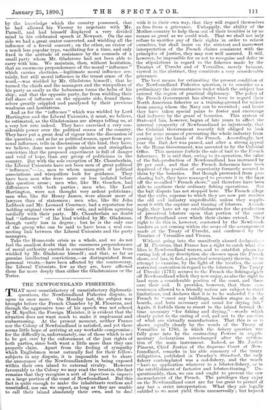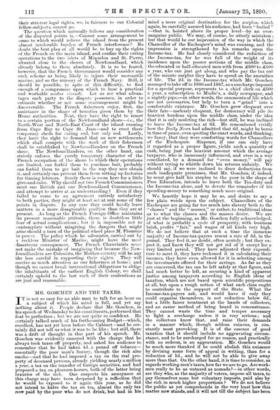THE NEWFOUNDLAND FISHERIES.
THAT most unsatisfactory of unsatisfactory diplomatic questions, the Newfoundland Fisheries dispute, is upon us once more. On Monday last, the subject was brought before the French Chamber by M. Flourens, and though the aggressive tone of his speech was not echoed. by M. Spuller, the Foreign Minister, it is evident that the situation does not want much to make it unpleasant and embarrassing. At the present moment, neither France nor the Colony of Newfoundland is satisfied, and yet there seems little hope of arriving at any workable compromise ; for the difficulty is, unfortunately, one of those which is not to be got over by the enforcement of the just rights of both parties, since both want a little more than they can properly claim. Apart from the feeling of sympathy which Englishmen must naturally feel for their fellow- subjects in any dispute, it is impossible not to share the annoyance of the Newfoundlanders in being exposed within their own island to external rivalry. However favourably to the Colony we may read the treaties, the fact remains that they recognise a sort of imperium in intperio on a large portion of the coast of Newfoundland. But this fact is quite enough to make the inhabitants restless and unsatisfied, nor can we expect, as long as they are unable to call their island absolutely their own, and to deal with it in their own way, that they will regard themselves as free from a grievance. Unhappily, the ability of the Mother-country to help them out of their troubles is by no means as great as we could wish. That we shall not only refuse to sacrifice any of their rights in order to relieve ourselves, but shall insist on the strictest and narrowest interpretation of the French claims consistent with the principles of justice, they may rest well assured. It will, however, be impossible for us not to recognise and defer to the stipulations in regard to the fisheries made by the Treaties of Utrecht and of Versailles, merely because, viewed in the abstract, they constitute a very considerable grievance.
The best means for estimating the present condition of the Newfoundland Fisheries question, is to consider as a preliminary the circumstances under which the subject has entered the region of practical diplomacy. The policy of the French Government has always been to regard their North American fisheries as a training-ground for sailors from among whom the Navy can be recruited ; and hence they have taken special pains to foster and encourage that industry by the grant of bounties. This system of State-aid has, however, begun of late years to affect the internal prosperity of Newfoundland so injuriously, that the Colonial Government recently felt obliged to look out for some means of preventing the whole industry from passing into the hands of the French. Accordingly, last year the Bait Act was passed, and after a strong appeal to the Home Government, was assented to by the Colonial Office. This measure forbids the sale of bait to the French fishermen. It is said that, owing to its operation, the value of the fish-production of Newfoundland has increased by 20 per cent., and that the French fishermen have been deprived of the position of superiority formerly secured to them by the bounties. But though prevented from pur- chasing bait, they have managed to procure it in the bays off the so-called "French shore," and therefore have been able to continue their ordinary fishing operations. But the bait dispute has not stopped here. The French allege that the extra expense to which they are now put renders the old cod industry unprofitable, unless they supple- ment it with the capture and tinning of lobsters. Accord- ingly, they have set up establishments for the production of preserved lobsters upon that portion of the coast of Newfoundland over which their claims extend. Their right to do this is, however, contested by the Newfound- landers as not coming within the scope of the arrangement made at the Treaty of Utrecht, and confirmed by the Treaties of Versailles and Vienna.
Without going into the manifestly absurd declaratio.r; of M. Flourens, that France has a right to catch what she likes in Newfoundland waters, and to establish places for curing fish of any description she chooses upon the French shore, and has, in fact, a practical sovereignty therein, let us attempt to examine, by the light of the treaties, the more restricted contention in regard to the lobsters. The Treaty of Utrecht (1713) secures to the French the fishing-rights off Newfoundland which they now enjoy, as also the right to land upon a considerable portion of the coast, and there cure their cod. It provides, however, that these con- veniences allowed to a friendly nation are subject to strict limitations, and declares that it is to be unlawful for the French to "erect any buildings, besides stages made of boards, and huts necessary and usual for drying 3sh." Again, it forbids them to resort to the island beyond the time necessary "for fishing and drying,"—words which clearly point to the curing of cod, and not to the erection of what are virtually manufactories. That this is so is shown equally clearly by the words of the Treaty of Versailles in 1783, in which the fishery question was fully gone into by the contracting Powers in supple- mentary declarations interchanged after the ratifica- tion of the main instrument. Indeed, as Mr. Justice Pinsent, Chief Justice of the Supreme Court of New- foundland, remarks in his able summary of the treaty obligations, published in Tuesday's Standard, the only fishery contemplated was a cod-fishery, and the words "have no application whatever to a lobster-fishery, or to the establishment of factories and lobster-tinning." Un- questionably, then, we can and ought to prevent the new encroachment of the French. The privileges they enjoy on the Newfoundland coast are far too great to permit of any but a strict interpretation. What they are legally entitled to we must yield them unreservedly ; but beyond their strictest legal rights, we, in fairness to our Colonial fellow-subjects, cannot go. The question which naturally follows any consideration of the disputed points is,—Cannot some arrangement be come to which would relieve the island from the present almost intolerable burden of French interference ? No doubt the best plan of all would be to buy up the rights of the French on the main island, and confine their curing operations to the two islets of Miquelon and St. Pierre, situated close to the shores of Newfoundland, which already belong to them absolutely. It is to be feared, however, that the French Government would consider any such scheme as being likely to injure their mercantile marine, and so the nursery of the French Navy. Still, it should be possible, in spite of this difficulty, to find enough of a compromise upon which to base a practical and workable modus rivendi. Let us see what advan- tages each party to the dispute possesses, in order to estimate whether or not some rearrangement might be discoverable. The French fishermen enjoy, first, the assistance in the shape of bounties given them by the Home authorities. Next, they have the right to resort to a certain portion of the Newfoundland shore—i.e., the North-West and North-East Coast of the island running from Cape Ray to Cape St. Jean—and to erect there temporary sheds for curing cod, but only cod. Lastly, they have the right to demand that no new settlements which shall compete with the work of their fishermen shall be established by Newfoundlanders on the French shore. The Newfoundlanders, on the other hand, can strictly enforce the purely temporary character of the French occupation of the shore to which their operations are limited, can forbid them to purchase bait, probably can forbid them to get bait in the way they now obtain it, and certainly can prevent them from setting up factories for tinning lobsters. Surely there is room here for a little give-and-take. Why should not two French Commissioners meet one British and one Newfoundland Commissioner, and attempt to arrive at an understanding ? Even if they failed to come to an agreement entirely satisfactory to both parties, they might at least set at rest some of the points in dispute. In any case they could hardly leave matters in a more disagreeable position than they are at present. As long as the French Foreign Office maintains its present reasonable attitude, there is doubtless little fear of actual complications ; but it is impossible not to contemplate without misgiving the dangers that might arise should a turn of the political wheel place M. Flourens in power. The policy which he advocates, carried out by a reckless Minister of Marine, might have the most -disastrous consequences. The French Chauvinists must not make the mistake of imagining that because the New- foundlanders are Colonists, the Mother-country will be any the less careful in supporting their rights. They will receive as much attention as our fishermen at home ; and though we cannot break international obligations to oblige the inhabitants of the earliest English Colony, we shall certainly uphold to the last such of their contentions as are just and reasonable.



















































 Previous page
Previous page